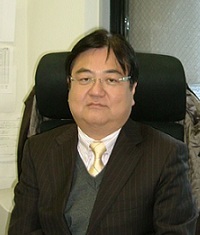
 Kenji Emori, Japanese Patent Attorney, President
Kenji Emori, Japanese Patent Attorney, President
Education
BS in chemical engineering, Yokohama National University, 1983
Japanese Patent Attorney, 1995.
Certificate in specific infringement litigations, 2007.
Technical areas
Organic chemistry, polymer chemistry, chemical engineering, electrochemistry, functional materials, conductive adhesives, photocurable resins
I gained experience in the development of products as a researcher in the research and development department of a foreign chemical company. I was also involved for a long time, as a patent engineer, in the acquisition of rights and license agreements in the intellectual property department of the same company. Then, taking advantage of my experience as an inventor and as a patent engineer and my experience in foreign businesses, I obtained my license of Japanese patent attorney with the objective of becoming a patent attorney with good judgment.
In order to satisfy our clients, I am eager to work hard every day and focus on my work without forgetting my initial resolution.
Why did you want to become a Patent Attorney?
Back to the time I was working as an engineer (an inventor), I had to consult patent attorneys on the content of some patent applications. At the time, I thought that it looked like an interesting job. In a sense, I felt that the work of a patent attorney was like playing a technical game with the inventors.
What is THE invention that revolutionized mankind?
The Chinese Three Great Inventions, “gunpowder”, “papermaking”, and “compass” are the inventions that, in my opinion, revolutionized mankind.
In addition, the invention of Alfred Nobel (who is at the origin of the Nobel Prize), i.e. “dynamite”, has reduced the risks of gunpowder. Thus, I could also include this invention in my answer.
At what point did you think “I am glad to be a patent attorney”?
Needless to say, it is when I receive words of gratitude from one of our clients for obtaining patent rights or for keeping a patent in force after an invalidation trial.
There are also difficult times, but, in these cases, I greatly appreciate receiving words of gratitude.
Currently, what are you putting your efforts at, and what are your challenges in order to improve yourself?
Would I dare say “improving my foreign language skills”?
There is a foreigner working in our firm, and it might be bothering her, but I am actively speaking to her in English.
Among the “secret tools” that come from the four-dimensional pocket of “Doraemon”, what would you materialize? Also, from which perspective would you write the specification of this patent?
This may be intended as a deep question, but if the “secret tool” served for writing specifications, first, what comes into my mind would be an object allowing to differentiate an invention from the prior art. Then, since I have a duty of confidentiality, I would keep it secret.
In the future, what do you think would be the abilities required for a patent attorney?
Of course, I think it is particularly efficient for the clients if their patent attorney can reflect on their invention with them, and if he/she can get ideas from them by getting involved from the time of the creation of the invention.
In this regard, I think it is important for a patent attorney to have a broad knowledge of technical fields such as chemistry, electricity, mechanics, or biology. Thinking of which, the company I used to work for was a multi-product development company and I estimate myself lucky to have gained experience there in the development of new products. I also have to thank the company’s budget that allowed me continue doing this job for a long time, more than 10 years, although not even one of these products was sold.
end faq
 |
Yuko Tanaka, Japanese Patent Attorney Education Technical areas |

















